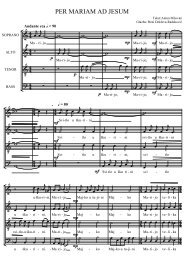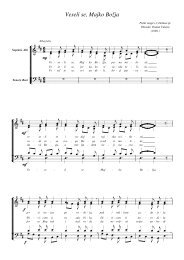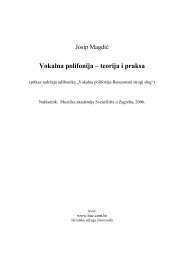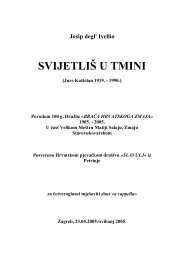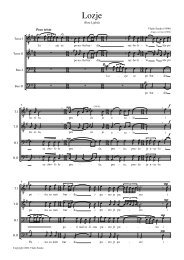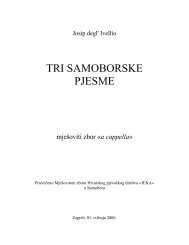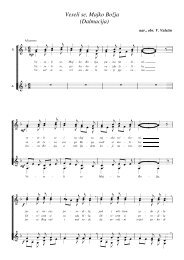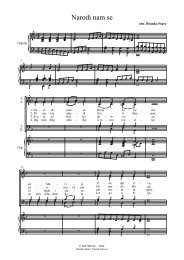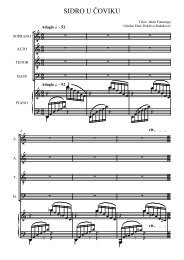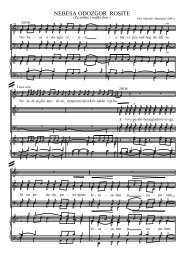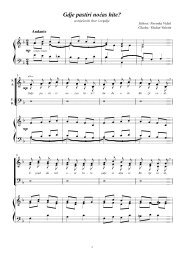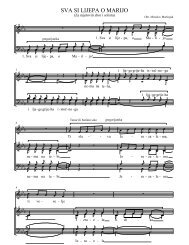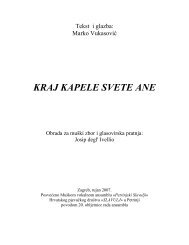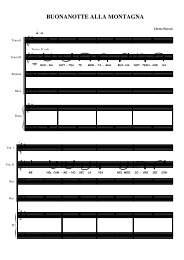ARS CHORALIS 2010 - Hrvatska udruga zborovođa
ARS CHORALIS 2010 - Hrvatska udruga zborovođa
ARS CHORALIS 2010 - Hrvatska udruga zborovođa
You also want an ePaper? Increase the reach of your titles
YUMPU automatically turns print PDFs into web optimized ePapers that Google loves.
Gustava Mahlera. Orkestar je svirao njemačkim časnicima popularne komade – Beethovenove simfonije,<br />
Puccinieve arije, Chopinove i Straussove valcere. Također su morali svirati i koračnice za<br />
iscrpljene i često bolesne zatočenike koji su s velikom mukom odlazili na prisilni rad. Projekt<br />
rekonstrukcije ovog bizarnog slučaja pokazuje kako se „slavljenje ljudskoga duha“ u nehumanim<br />
vremenima može izroditi u čistu njegovu degradaciju.<br />
Baris Gurkan (Turkey) (1980) • Undergraduate: Ege University,<br />
Traditional Turkish Music State Conservatory, Turkish<br />
Folk Music Department; Master: Ege University, Audio<br />
Design Program, Ethnomusicology; Official Duty: As a<br />
Lecturer in Traditional Turkish Music Department of Dilek<br />
Sabanci State Conservatory in Selcuk University; Notes: I have<br />
studied ethnomusicology with Prof. Dr. Yetkin Ozer and Prof.<br />
Dr. Ahmet Yurur for four years. I am as an ethnomusicology<br />
student, have a professional curiosity about relation between ‘religion and music’.<br />
I have been studying Yoruba origin religion Santeria and Bata drum tradition in<br />
Cuba, for two years.<br />
• Bata Drum as a Pre-Eminet Sacred Instrument in Orisha Worship<br />
and Religious Music of Santeria in Cuba (L) (E)<br />
Santeria, known also as Lucumi or ‘Regla de Ocha’ (Rules of Ocha), is an AfroCuban syncretic<br />
religion which includes elements from Yoruba Orisha worship and Catholicism in Cuba. Lucumi<br />
society is known the descendents of Yoruba people who are living in contemporary geographical<br />
areas of southwestern Nigeria and the southeastern portion of the Republic of Benin. Yoruba people<br />
lived under the control of one of the strongest West African kingdoms, Oyo Empire which its capital<br />
was the spiritual center of Orisha worship. In the first half of nineteenth century, Cuba produced an<br />
important part of (one of the third) sugar demand of the world, for this reason there were in large<br />
quantities requirement for labour in this period. This period also has witnessed the collapse of Oyo<br />
Empire. Thousands of Yoruba people brought their believes and cultures to Cuba, as slave, until<br />
prohibition of slave trade. Along with the impacts of historical and political developments on their<br />
livess, New World included reinterpretation process of cultural components and religious traditions.<br />
Through reinterpretation process, for example, has not changed the fundamentals of Orisha<br />
worship but structure that consist of regional particular orisha system, has incorporated under a<br />
frame. In Yorubaland, the fact that every city has own orisha and the other application that every<br />
orisha has own drum set has changed in Cuba, and in contemporary Cuba, the principle instrument<br />
of Orisha Worship is bàtá drum set. At the same time, repertoires of the other Yoruba origin drums<br />
has incorporated in bàtá drum repertoire. The reasons of to be admitted bàtá as the preeminent<br />
drum set in Cuba may be based on three main situations: Firstly, the task of bàtá drum, as a talking<br />
drum, is transmission more than musical performance. The capability of a drum set to provide<br />
well communication between gods and worshippers in Orisha worship depends on sufficiency of<br />
reproduce the tones of Yoruba words. Bàtá drum set that consist of three distinct sized body and<br />
The First International Artistic and Scientific Symposium on Choral Art, Singing and Voice – Zagreb, Croatia<br />
17



